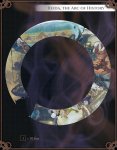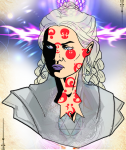arkwright
Explorer
Hullo, all.
Adslahnit, one of my players, has with the assent of the rest urged me to upload logs of what is affectionately named Arkgeist, our journey through the fantabulous Zeitgeist adventure path with me as GM. Thus, what follows.
DISCLAIMERs
PLAYER CHARACTERs
EDIT: Adslahnit has requested that I post some material from Arkgeist.
First, Graves of Elfaivar, small epitaphs/last words from Ascetian souls of women who died in the Great Malice.
Secondly, the 'sheets' I created for the various convocation factions, including what specific planes they seek to invoke, and then some new ones that cropped up.
Planes of the Obscurati
Miller's Pyre, Arboretum, Watchmakers, Colossus, Panarchists.
Minor Factions, Radical Factions.
MAP, Colossal Congress, Watchmaker Watchmen, Miller's Clock, Colossal Conquest
SPS 2.0
Ryan Nock, the whole Zeitgeist team- thank you for writing what has given us nearly two years of top-quality enjoyment and meaningful storytelling.
And now I'll sign off with a few memes and images we have created or commissioned or found over the course of the AP.
Adslahnit, one of my players, has with the assent of the rest urged me to upload logs of what is affectionately named Arkgeist, our journey through the fantabulous Zeitgeist adventure path with me as GM. Thus, what follows.
DISCLAIMERs
- My players a terribly large fans of anime art, anime-esque roleplay and anime-esque verbal tics. And, after so long running this game and others, I've probably also become infected (curse anime, with its exhaustively and thus seductively tagged boorus). We don't have anyone going nyaaa, but we have (or had) tics close to it, so if anyone is allergic to the animays, do not read on.
- We play text-only on Discord, using the wonderful Maptool program for dicerolls & mapping.
- We play the 4e version, with a heavy set of house-rules, and as of Saturday we have hit level 30. For most of the AP I have not altered Zeit encounters. As time went on, I have occasionally worked to increase the challenge by multiplying foes, and now that we are in late-epic I have become willing to incorporate high-quality third-party 4e encounter components (such as the Living Forgotten Realms epic adventures) to make certain Zeit encounters more complete and challenging.
- Below, I will be including logs from our numerous side channels. Our usage of these steadily increased as we got more familiar with the style of the book, and as we grew into our respective characters- them with their PCs, me with my NPCs. Books 1-3 were mostly by-the-book, off-script began in Book 4, and revisions have fairly steadily increased all the way up to where we are now, in Book 12. With that said, I have worked hard to keep new material well within the bounds of 'vanilla' Zeitgeist, or expanding only upon areas that are flagged by the books as avenues for expansion.
- In age-rating terms, there should be no nudity, but in-keeping with anime tropes, there will be a fair amount of 'suggestive' content, scantily-clad cartoon girls, and briefly lewd conduct. Before you judge, do note that this is the AP that includes the Akela Sathi, Legion succubi, and the legendary Captain Thrusty.
- Zeitgeist is, in my opinion, the greatest D&D adventure of all time. I say this to convey my overall judgement of the AP, to make the following criticism less harsh: it is also, in my view, an AP that is riddled with flaws. Its encounter math ranges between 'good', 'janky' and 'bad', mostly in the 'janky' camp. It is clear that at certain points, Messrs Hillman and Nock did not communicate well when writing their separate books, or did not plan well. The Player's Guide's setting information is heavily aspirational, and includes elements that contradict the AP or a skipped over so completely that they effectively do not exist. Nicodemus the Gnostic has far less of a philosophical agenda than it initially seems, as an invitation for GMs to insert their own to fit their group, an invitation I did not realize until quite late. Mechanics for planes, their abilities and manipulations seem to change from book to book as the AP progresses. It has 'remnant plots', elements which were introduced and then decided against later in the writing stage but never properly deleted from the AP. Despite all those flaws, again, it is in my considered opinion the greatest D&D adventure of all time. If you like I'll post a screenshot of my Act 1 hardcover as proof. My players are in broad agreement with this.
- (Placeholder for future DISCLAIMERs that will only occur to me later/when prompted).
PLAYER CHARACTERs
- Queen Ruri Eccles, the Monitor, previously a Corporal then Major in the Risuri Navy, played by the redoubtable Lily Fae. Ruri has been with us from the beginning along with her trusty airgun, a calm and battle-tested ruler chosen by the now-stepped down King Aodhan.
- Seer Ayesha Saraswati, the Princess of weretigerbunnies, the Ultimate Mage, the Rearranger of the Planes, the Tamer of Dreams, played by the irrepressible Earth Seraph Edna/Adslahnit. Similarly having been with us from the beginning, Ayesha is the child of two Elfaivaran skyseers and a compassionate partner and mother, beloved by many.
- Constable Maaya the Githzerai, played by the honorable Aiden, retired. Present from books 1 to 3, IRL issues meant that Maaya dropped out thereafter, hence to fade into the background whilst still performing good work to promote peace between Flinters and Githzerai immigrants from the Border States, once the colonial subjects of the mighty and cruel Elfaivaran Empire.
- Cerise Fleur, AKA Cheryl Blossom, claimant to the heritage of Egal the Shimmering, played also by the dauntless Aiden, retired. Present from books 5 to 9, Aiden is now beloved alumni from our game whilst Cheryl fights an off-screen crusade against the tyrannical Golden Legion.
- Gwyndolin the Dark Sun, played by a fellow for a mere two or three sessions amidst Book 4 before vanishing. His PC survives now as a secondary antagonist, favored servant of the Voice of Rot.
EDIT: Adslahnit has requested that I post some material from Arkgeist.
First, Graves of Elfaivar, small epitaphs/last words from Ascetian souls of women who died in the Great Malice.
Secondly, the 'sheets' I created for the various convocation factions, including what specific planes they seek to invoke, and then some new ones that cropped up.
Planes of the Obscurati
Miller's Pyre, Arboretum, Watchmakers, Colossus, Panarchists.
Minor Factions, Radical Factions.
MAP, Colossal Congress, Watchmaker Watchmen, Miller's Clock, Colossal Conquest
SPS 2.0
Ryan Nock, the whole Zeitgeist team- thank you for writing what has given us nearly two years of top-quality enjoyment and meaningful storytelling.
And now I'll sign off with a few memes and images we have created or commissioned or found over the course of the AP.
Attachments
-
 ArcofReida3.jpg1 MB · Views: 358
ArcofReida3.jpg1 MB · Views: 358 -
 BakeryHivemind.jpg912.1 KB · Views: 295
BakeryHivemind.jpg912.1 KB · Views: 295 -
 BeardedEagleofDunkelweiss.jpg616.3 KB · Views: 289
BeardedEagleofDunkelweiss.jpg616.3 KB · Views: 289 -
 BellyofSheWhoWrithes.jpg1.3 MB · Views: 305
BellyofSheWhoWrithes.jpg1.3 MB · Views: 305 -
 BonilatheTheStormClaw.jpg1.3 MB · Views: 378
BonilatheTheStormClaw.jpg1.3 MB · Views: 378 -
 CaptainThrustyPartyTime.png71.2 KB · Views: 298
CaptainThrustyPartyTime.png71.2 KB · Views: 298 -
 Copperhat5.png157.7 KB · Views: 302
Copperhat5.png157.7 KB · Views: 302 -
 CourtofGlauciaEvora.jpg306.3 KB · Views: 309
CourtofGlauciaEvora.jpg306.3 KB · Views: 309 -
 DuplicantTinker.jpg326.6 KB · Views: 269
DuplicantTinker.jpg326.6 KB · Views: 269 -
 EkossiganOfWinter.jpg87.3 KB · Views: 276
EkossiganOfWinter.jpg87.3 KB · Views: 276 -
 GaleSummer.png1.2 MB · Views: 284
GaleSummer.png1.2 MB · Views: 284 -
 GnollCultistPack.jpg142.9 KB · Views: 305
GnollCultistPack.jpg142.9 KB · Views: 305 -
 GrandisKomanovSacramented.png1.8 MB · Views: 345
GrandisKomanovSacramented.png1.8 MB · Views: 345 -
 GrandSavantHead.jpg113.7 KB · Views: 312
GrandSavantHead.jpg113.7 KB · Views: 312 -
 HedgehogCourtStandard.jpg99.4 KB · Views: 292
HedgehogCourtStandard.jpg99.4 KB · Views: 292 -
 Hewanharimau.jpg117.9 KB · Views: 266
Hewanharimau.jpg117.9 KB · Views: 266 -
 Kuyler.png178.8 KB · Views: 293
Kuyler.png178.8 KB · Views: 293 -
 Natalia3.jpg720.5 KB · Views: 322
Natalia3.jpg720.5 KB · Views: 322 -
 PartyMeme.png1.8 MB · Views: 339
PartyMeme.png1.8 MB · Views: 339 -
 StanfieldAlive.png575.6 KB · Views: 311
StanfieldAlive.png575.6 KB · Views: 311 -
 ThoughtbeastFlyingThing.jpg87.5 KB · Views: 305
ThoughtbeastFlyingThing.jpg87.5 KB · Views: 305 -
 UnusualPit Fiend.jpg486.7 KB · Views: 329
UnusualPit Fiend.jpg486.7 KB · Views: 329 -
 VirginMeme.jpg901.7 KB · Views: 298
VirginMeme.jpg901.7 KB · Views: 298 -
 YoungKasvarina.jpg1,021.8 KB · Views: 344
YoungKasvarina.jpg1,021.8 KB · Views: 344 -
 ZeitToddHoward.png209.5 KB · Views: 329
ZeitToddHoward.png209.5 KB · Views: 329
Last edited:


